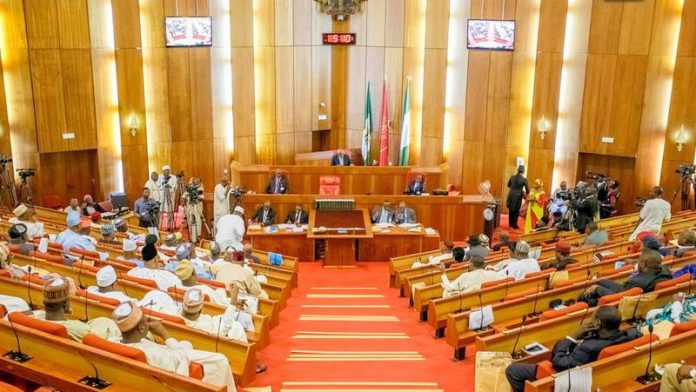The Senate on Wednesday considered a critical bill that would see to the eventual repeal of the obsolete Quarantine Act enacted in 1926, and help Nigeria deal with any impending outbreak of infectious and contagious diseases in the future.
The Health Emergency Bill, 2021, which scaled Second Reading on the floor during plenary, also does not make it mandatory for any Nigerian to be subjected to forced immunization under the proposed legislation.
Sponsor of the bill, Senator Chukwuka Utazi (PDP, Enugu North), said the piece of legislation under consideration was informed by the challenges that confronted the nation regarding the coordination of national response measures to combat the dreadful coronavirus crisis.
According to the lawmaker, the Executive in an attempt to scale the loopholes created as a result of the extant archaic Quarantine legislation, was compelled “to embark on a litany of subsidiary legislations to deal with certain exigencies” at the time.
Utazi stated that the Health Emergency Bill, when passed and signed into law, would establish an updated comprehensive legal and administrative framework for handling outbreaks of infectious and contagious diseases that portends major threat to public health safety within Nigeria, or are likely to be transmitted into Nigeria or outside Nigerian borders, if quarantine or other emergency health measures are not taken by appropriate authorities to control spread or infection rate.
He, specifically, emphasized that the Bill provides the legal and institutional framework for imposition and implementation of mandatory seIf-isolation and quarantine of infected persons, introduction of movement restrictions, and adoption of appropriate safety and welfare measures at or during the outbreak of dangerous contagious diseases.
He said, “it provides statutory recognition for power of the President, and in appropriate circumstances, the Governor, to declare any place or area ”an infected area” and accordingly issue appropriate regulations or directives to prevent the spread of such infections in Nigeria, and the transmission from Nigeria to any other part of the world.
“It also provide for funding and accountability mechanisms for containment measures introduced at the outbreak or during disease epidemics and pandemics.
“This Bill further prescribes offences and appropriate punishments for violations and contraventions associated with the control and management of dangerous contagious disease epidemics or pandemics.”
The lawmaker added that the Bill in repealing the archaic Quarantine Act of 1926 and under schedules l and II, expands the scope and interpretation of dangerous infectious diseases beyond what is contained in the Quarantine Act.
“There is no gainsay that the extant Quarantine Act, CAP Q 2, Laws of the Federation of Nigeria, 2004 which was enacted in 1926 is deficient for the purposes of enforcing quarantine and self-isolation of infected persons at or during the outbreak of dangerous contagious disease epidemics or pandemics in the country.
“Indeed, most of the aliments like cholera, plague, yellow fever, smallpox and typhus that warranted the enactment of the Quarantine Act of 1926 do not require the same quarantine measures as today’s complex and deadly epidemics such as ebola and Covid-19.
“The passage of this Bill will effectively address these shortcomings and put in place a legislation that is up to date with modern realities regarding disease epidemics or pandemics,” he added.
Utazi, however, emphasized that the piece of legislation most importantly, “is devoid of any controversial clauses and no individual will be subjected to forced immunization under the proposed legislation.”
According to the lawmaker, the Bill is made up of 72 clauses which are subdivided into eight parts.
“Major highlights of the Bill include Part II which deals with important aspects of the Bill such as the power of the President, and in appropriate circumstances, the Governor of a State, to declare any place as an infected area at the outbreak of dangerous epidemics or pandemics; appointment of a Special task force for effective coordination of national remedial measures at the outbreak of dangerous infectious diseases.
“The sources of funding the activities of the task-force and other expenditure requirements during such public health emergencies are also articulated in clause 5, part II of the Bill.
“Part iii of the Bill deals with the administration of the Bill which is mainly vested in the Director General of Nigeria Centre for Disease Control and his heath officers.
“Part IV provides for the control of infectious diseases within the Federal Republic of Nigeria and provides the necessary safeguards on the powers of the DG NCDC by vesting supervisory powers on the Honourable Minister of Health.
“Clause 10, Part IV of the Bill also provides for public health surveillance to track trends, prevalence and patterns of disease outbreak in the Country during a National Health emergency period caused by sudden outbreak of dangerous infectious diseases.
“Part V of the Bill deals with the prevention of international spread of infectious diseases where the President has reason to believe that a dangerous infectious disease may be introduced into Nigeria through International contacts borne by various modes of transportation while part VI of the Bill provides for enforcement measures by vesting certain powers on the National Centre for Disease Control in dealing with outbreaks and suspected outbreaks of infectious diseases.
“This is without prejudice to the powers of the NCDC under its enabling Act. Part V“ gives certain rights to users of healthcare facilities or those in quarantine. These rights include right to privacy and confidentiality of their medical records except under permissible situation under the Bill or the 1999 Constitution of the Federal Republic of Nigeria, as amended.
“Part Viii contains miscellaneous provisions such as the modalities for service of notices, etc, default in compliance, general offences and exemptions. By and large,this bill simply wants to protect the general populace from the debilitating impact of the outbreak dangerous infections disease”, Utazi explained.
The Senate President, Ahmad Lawan, referred the bill after scaling Second Reading to the Committee on Primary Health Care and Communicable Diseases for further legislative work.
The Committee is expected to report back in two weeks.
Meanwhile, the Senate also on Wednesday considered a bill for an Act to establish the National Environmental Research and Training Institute.
The bill which scaled second reading was sponsored by Senator Christopher Ekpenyong (PDP, Akwa-Ibom North West).
According to the lawmaker, the Institute when established would provide the right signals to build capacity for increased research on ecosystems, the long term impact of human activity on the environment and the employment effects of new technology amongst others.
The bill after consideration was referred by the Senate President to the Committee on Environment to report back in four weeks.













